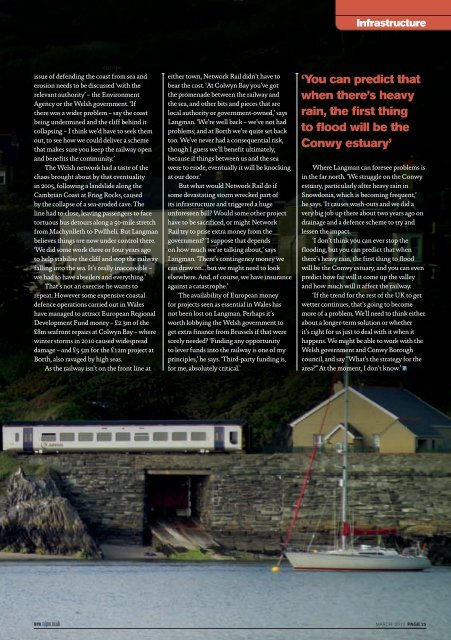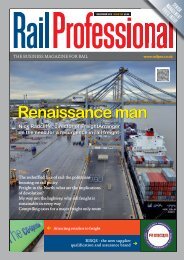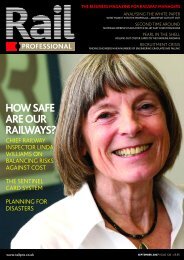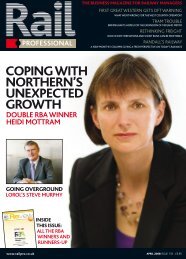View as PDF - Rail Professional
View as PDF - Rail Professional
View as PDF - Rail Professional
Create successful ePaper yourself
Turn your PDF publications into a flip-book with our unique Google optimized e-Paper software.
Xxxxxxxxxxx<br />
Infr<strong>as</strong>tructure<br />
europe<br />
issue of defending the co<strong>as</strong>t from sea and<br />
erosion needs to be discussed ‘with the<br />
relevant authority’ – the Environment<br />
Agency or the Welsh government. ‘If<br />
there w<strong>as</strong> a wider problem – say the co<strong>as</strong>t<br />
being undermined and the cliff behind it<br />
collapsing – I think we’d have to seek them<br />
out, to see how we could deliver a scheme<br />
that makes sure you keep the railway open<br />
and benefits the community.’<br />
The Welsh network had a t<strong>as</strong>te of the<br />
chaos brought about by that eventuality<br />
in 2005, following a landslide along the<br />
Cambrian Co<strong>as</strong>t at Friog Rocks, caused<br />
by the collapse of a sea-eroded cave. The<br />
line had to close, leaving p<strong>as</strong>sengers to face<br />
tortuous bus detours along a 50-mile stretch<br />
from Machynlleth to Pwllheli. But Langman<br />
believes things are now under control there.<br />
‘We did some work three or four years ago<br />
to help stabilise the cliff and stop the railway<br />
falling into the sea. It’s really inaccessible –<br />
we had to have abseilers and everything.’<br />
That’s not an exercise he wants to<br />
repeat. However some expensive co<strong>as</strong>tal<br />
defence operations carried out in Wales<br />
have managed to attract European Regional<br />
Development Fund money – £2.3m of the<br />
£8m seafront repairs at Colwyn Bay – where<br />
winter storms in 2010 caused widespread<br />
damage – and £5.5m for the £12m project at<br />
Borth, also ravaged by high se<strong>as</strong>.<br />
As the railway isn’t on the front line at<br />
either town, Network <strong>Rail</strong> didn’t have to<br />
bear the cost. ‘At Colwyn Bay you’ve got<br />
the promenade between the railway and<br />
the sea, and other bits and pieces that are<br />
local authority or government-owned,’ says<br />
Langman. ‘We’re well back – we’ve not had<br />
problems; and at Borth we’re quite set back<br />
too. We’ve never had a consequential risk,<br />
though I guess we’ll benefit ultimately,<br />
because if things between us and the sea<br />
were to erode, eventually it will be knocking<br />
at our door.’<br />
But what would Network <strong>Rail</strong> do if<br />
some dev<strong>as</strong>tating storm wrecked part of<br />
its infr<strong>as</strong>tructure and triggered a huge<br />
unforeseen bill Would some other project<br />
have to be sacrificed, or might Network<br />
<strong>Rail</strong> try to prise extra money from the<br />
government ‘I suppose that depends<br />
on how much we’re talking about,’ says<br />
Langman. ‘There’s contingency money we<br />
can draw on… but we might need to look<br />
elsewhere. And, of course, we have insurance<br />
against a cat<strong>as</strong>trophe.’<br />
The availability of European money<br />
for projects seen <strong>as</strong> essential in Wales h<strong>as</strong><br />
not been lost on Langman. Perhaps it’s<br />
worth lobbying the Welsh government to<br />
get extra finance from Brussels if that were<br />
sorely needed ‘Finding any opportunity<br />
to lever funds into the railway is one of my<br />
principles,’ he says. ‘Third-party funding is,<br />
for me, absolutely critical.’<br />
‘You can predict that<br />
when there’s heavy<br />
rain, the first thing<br />
to flood will be the<br />
Conwy estuary’<br />
Where Langman can foresee problems is<br />
in the far north. ‘We struggle on the Conwy<br />
estuary, particularly after heavy rain in<br />
Snowdonia, which is becoming frequent,’<br />
he says. ‘It causes w<strong>as</strong>h-outs and we did a<br />
very big job up there about two years ago on<br />
drainage and a defence scheme to try and<br />
lessen the impact.<br />
‘I don’t think you can ever stop the<br />
flooding, but you can predict that when<br />
there’s heavy rain, the first thing to flood<br />
will be the Conwy estuary, and you can even<br />
predict how far will it come up the valley<br />
and how much will it affect the railway.<br />
‘If the trend for the rest of the UK to get<br />
wetter continues, that’s going to become<br />
more of a problem. We’ll need to think either<br />
about a longer-term solution or whether<br />
it’s right for us just to deal with it when it<br />
happens. We might be able to work with the<br />
Welsh government and Conwy Borough<br />
council, and say “What’s the strategy for the<br />
area” At the moment, I don’t know.’<br />
MARCH 2012 PAGE 25
















